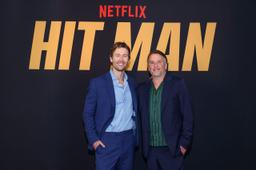The reports of the death of the movie star have been greatly exaggerated. Look no further than the Dune franchise’s young A-listers—Timothée Chalamet, Zendaya, Florence Pugh, Austin Butler—and you’ve got a quartet that could lead high-profile projects for the foreseeable future. What is true is that the pathways to becoming a movie star have been whittled down. Mid-budget dramas and romantic comedies have migrated to streaming, while blockbusters are largely sold on the allure of familiar IP, rather than the actors headlining them. These are the ideal conditions to create a movie star recession, but with enough effort—and a little bit of luck—it’s still possible to cut through the noise.
Let’s say this for Glen Powell: That man is doing an all-out blitz to make a name for himself. Once a scene-stealing supporting player in Richard Linklater’s Everybody Wants Some!!, Powell has emerged as a legitimate leading man. The first inkling that Powell had the it factor was Set It Up, the 2018 Netflix rom-com that seems like it could’ve been released in the ’90s (complimentary, obviously). Set It Up latched on to the qualities that make Powell such a magnetic on-screen presence: His character initially presents as a smarmy bro before peeling back the layers to reveal a stand-up guy, all the while oozing charm. We were ready to anoint him as Hollywood’s next big thing—and by we, I mean this very website.
Since then, Powell has appeared in blockbusters (Top Gun: Maverick, Twisters), a studio rom-com (Anyone but You), and another Linklater joint (Hit Man), and he even cocreated a TV show (Chad Powers). Next up is The Running Man, the second big-screen adaptation of the Stephen King novel of the same name, in which Powell will take on a role once played by action-cinema royalty, Arnold Schwarzenegger. (The workout regimen, to be fair, looks Arnold-esque in its intensity.) But in his quest to become a jack-of-all-trades movie star, does Powell risk being a master of none?
When it comes to Powell’s post–Set It Up output, there’s intention behind every project. He’s famously been taken under the wing of Tom Cruise, who knows a thing or two about cultivating an on-screen brand. This included Powell watching a six-hour “film school” that Cruise put together, in which the latter imparted knowledge about his experiences in the industry. Only a select few will ever see the contents of Cruise Film School™, but from the roles Powell has taken on—and, just as important, the ones he’s passed on—we can infer that he’s taking a Cruise-esque approach to modern stardom.
For one, the kind of IP matters. Powell turned down starring roles in a Bourne Identity reboot and Jurassic World: Rebirth—passing on the latter because his “presence in this movie doesn’t help it.” (A very polite way of saying that Rebirth was, as audiences would learn, an unimaginative cash grab without any interesting characters to latch on to.) Powell has also avoided anything too self-important, cognizant that a hyper-demanding role worthy of accolades doesn’t always equate to cultural staying power. “Rewatchable is an important word,” Powell told The New York Times last year. “This is where I think actors who want to be serious get it wrong. Flogging yourself and showing how tortured and serious you can be—people often don’t rewatch, which takes all the power out of it.”
Instead, Powell has attached himself to franchises that feel less stale; perhaps, in part, because they hadn’t already been revived in the 21st century. Nobody would argue that Powell is competing for the lead with Cruise in Maverick, but as the cocky, combative pilot with the call sign Hangman—because he’ll leave his wingman out to dry—he’s got the most satisfying arc. After Powell successfully campaigned for the character to be rewritten, it ends up being Hangman who checks his ego at the door and saves Maverick in the film’s climax. Powell undergoes a similar trajectory as the colead in Twisters. His character, Tyler Owens, a YouTuber fashioning himself as the “Tornado Wrangler,” appears shamelessly opportunistic, using natural disasters for internet clout. But then we discover that Owens gives back to the affected communities—in classic Powell fashion, behind all his character’s posturing is a heart of gold. (It doesn’t hurt that he looks great in a wet T-shirt, either.)
The surest sign that someone is beginning to reach movie star status, however, is when their non-IP projects can also take the box office by storm. Powell returned to the rom-com well with Anyone but You, a loose adaptation of Shakespeare’s Much Ado About Nothing. Much was made of the potential factors that turned Anyone but You into a runaway hit: a viral TikTok trend, the (fabricated) rumors of an on-set fling with costar Sydney Sweeney, or a moviegoing public needing more romantic comedies in their lives. But maybe the answer is staring us right in the face: that Powell’s presence has become a selling point in and of itself.
Unfortunately, the perfect case study for assessing Powell's movie star bona fides never got a wide theatrical release. Powell and Linklater reunited with Hit Man, a crime caper inspired by the real-life story of Gary Johnson, a college professor who pretended to be a killer for hire in sting operations. (The not-so-true part: Powell’s Johnson falls in love with a woman, played by Adria Arjona, who’d hired him to kill her husband.) For Powell, Hit Man was the ultimate showcase: In addition to playing another romantic lead, he could inhabit various assassin archetypes under ridiculous wigs. There are some interesting ideas at play in Hit Man—blurring the line between the person you are and the persona you take on is an existential quandary that surely haunts every Method actor—but most of all, it’s a fun ride from start to finish. Premiering to rave reviews at the 80th Venice International Film Festival, Hit Man had all the makings of being Linklater’s biggest commercial hit since Boyhood. But when Netflix acquired the film, it was hard to shake the feeling that Hit Man’s cultural footprint would be hampered on the streaming service, where even good films can get lost in the ether.
In any event, Powell’s recent filmography has explored the different facets of the movie star: He can play a heartthrob, he’ll induce laughs, and he looks the part of an action hero. But there’s another side to Powell we can’t ignore: This dude really loves to play dress-up. Costumes and wigs were a big part of Hit Man—a film he cowrote—and it’s all over the DNA of Chad Powers. The Hulu series, inspired by an Eli Manning ESPN sketch, sees Powell play Russ Holliday, a disgraced former college quarterback who, with the help of prosthetics—his dad is a professional makeup artist—becomes a walk-on at the fictional University of South Georgia as, you guessed it, Chad Powers.
There are some shared vibes with Ted Lasso—another show based on a sports skit—but there’s no escaping the fact that Chad Powers comes across as an utterly baffling “one for me” for Powell to take on at the height of his, well, powers. He adopts the most cartoonish southern accent this side of Benoit Blanc and looks like Wyatt Russell if he were suffering from radiation poisoning. Powell’s been so selective with his projects, so I can’t help but search for a galaxy-brained rationale behind Chad Powers. Over the six-episode season, Powell’s character does experience an identity crisis—what if Russ hates himself so much that he’d rather be Chad?—and, if you squint hard enough, it’s kind of profound. Maybe Powell is commenting on the lengths one has to go to in order to become a movie star, cultivated for mass appeal to the extent that you no longer recognize the person you were. Or maybe he just thinks that Chad saying he “grew up off the grid where the crawdads are” scratches a comedy itch that nothing else can offer. Whatever the case, Chad Powers’s lukewarm reception speaks for itself: It’s an ill-timed fumble when Powell’s career was on the upswing.
Now, I’d be willing to dismiss another wig-centric role as mere coincidence, but with The Running Man, three makes a trend. The movie is set in a dystopian future, and Powell’s blue-collar protagonist, Ben Richards, is struggling to make ends meet, let alone procure medicine for his sick daughter. Richards reluctantly agrees to compete in The Running Man, a reality series in which he must survive 30 days while being hunted by assassins. In practice, that means Richards must become a master of disguise, at times dressing up as a businessman, a war veteran, and a blind priest. (The priest, for some reason, is Irish, so Powell gets to mess around with an Irish accent.)
It’s clear as day that these sequences are the most fun Powell has throughout The Running Man; the rest of the time, Richards is ill-tempered and abrasive, an odd fit for the actor’s innate charisma. But even though he’s starring in a blockbuster that doesn’t put all his talents to good use, Powell always keeps you glued to the screen. Perhaps that’s the surest mark that someone has become a star: Even a mediocre movie feels worth your time.
If Powell is going to take the next step, however, he needs more Twisters and fewer Running Mans on his CV. That’s where Powell’s chameleonic impulses could come in handy. With more wigs than Schitt's Creek’s Moira Rose, he’s a unique type of leading man who’s forging his path in projects that hearken back to a bygone era for A-listers: rom-coms, disaster movies, action flicks that don’t require spandex. Movie stars might be an endangered species, but Powell seems like proof of concept that charisma, versatility, and self-awareness can still go a long way. Powell’s career is off to the races—now it’s just a matter of seeing whether he can keep his foot on the gas.






